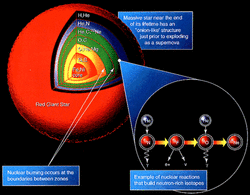You are using an out of date browser. It may not display this or other websites correctly.
You should upgrade or use an alternative browser.
You should upgrade or use an alternative browser.
Astronomy - question about the sun...
- Thread starter Maz
- Start date
Page may contain affiliate links. Please see terms for details.
Night Train
Maker of Things
- Location
- Greater Manchester
It's not exploding, it is fusion of Hydrogen into Helium consuming about 4 million tons per second and the outward forces that are there are mostly constrained by the gravitational forces caused by the mass of the Sun.
I think you might be confusing chemical hydrogen burning i.e. where it mixes and chemically combines with oxgyen with an explosion or flame with nuclear burning of hydrogen which is hydrogen fusing with itself to form helium. There is no oxygen in the sun for the former and the energy out is trivial compared to what you get in nuclear burning. The rate of burning is governed by the temperature and density of the hydrogen i.e the atoms of hydrogen have to collide together at a high enough speed to fuse. This limits the rate at which it burns up and prevents it all burning up in one go. HTH
Leedsbusdriver
Every breath leaves me one less to my last
- Location
- West Yorkshire
Well The News Of The World imploded
Maz
Guru
That's exactly the confusion I was having. Thanks for the clarification.I think you might be confusing chemical hydrogen burning i.e. where it mixes and chemically combines with oxgyen with an explosion or flame with nuclear burning of hydrogen which is hydrogen fusing with itself to form helium. There is no oxygen in the sun for the former and the energy out is trivial compared to what you get in nuclear burning. The rate of burning is governed by the temperature and density of the hydrogen i.e the atoms of hydrogen have to collide together at a high enough speed to fuse. This limits the rate at which it burns up and prevents it all burning up in one go. HTH
I still don't get it. I read that the sun is 70% hydrogen (most of those 'onion layers' in that diagram), but with all that heat, wouldn't the hydrogen just explode (as opposed to being converted to helium)?
Ah I see. The actual processes. It is somewhat complicated. There is the core where 'burning' happens and then in a sun like ours a zone where energy is transferred by radiation (diffusion) and another by convection. It's a lot more complicated than that because there are lots of intricate reactions that can happen further out in some stars and not others.
You don't even need to be a star to have deuterium burning.
If you want to understand it, it all comes down really to a few graphs about binding energy per nucleon that you can get hold of.
biggs682
Itching to get back on my bike's
- Location
- Northamptonshire
i never get passed page 3 !
Ah I see. The actual processes. It is somewhat complicated. There is the core where 'burning' happens and then in a sun like ours a zone where energy is transferred by radiation (diffusion) and another by convection. It's a lot more complicated than that because there are lots of intricate reactions that can happen further out in some stars and not others.
You don't even need to be a star to have deuterium burning.
If you want to understand it, it all comes down really to a few graphs about binding energy per nucleon that you can get hold of.
I'll paraphrase Marinho's reply for you Maz.
You're too stupid to understand

Yeah, as others have said, the sun isn't burning in the same way as would happen if you lit a flask of hydrogen. It's basically a nuclear fusion reactor with hydrogen as its fuel, which it converts into heavier elements (mostly helium) by fusing hydrogen atoms together. When that happens, there is a bit of energy left over, which is radiated as heat and light. (obviously it's all a bit more complicated than that, but that's the basic idea)
Interestingly, if you had an environment of 100% hydrogen, you wouldn't be able to ignite it, as you need oxygen for that kind of reaction. There's a moon (of Jupiter, I think, but I'm a bit hazy) where the atmosphere is mainly methane, but you wouldn't be able to light it as there is little or no oxygen there.
Interestingly, if you had an environment of 100% hydrogen, you wouldn't be able to ignite it, as you need oxygen for that kind of reaction. There's a moon (of Jupiter, I think, but I'm a bit hazy) where the atmosphere is mainly methane, but you wouldn't be able to light it as there is little or no oxygen there.
Globalti
Legendary Member
I wish I knew more about the science of combustion; sometimes I sit watching bits of wood burning in our stove and wonder why they burn the way they do. Somebody wrote something about a fire with "secondary combustion" going on and I wish I understood that. I assume they meant that the burning material was giving off hot gases and burning at a very high temperature rather than the outside just flaming.
Francesca
Well-Known Member
- Location
- Preston,Lancashire, and the Moon
numbnuts
Squire
- Location
- Gone over the hill and far away
I would love to know more about astronomy, but it's a bit over my head



 (or drive you mad!)
(or drive you mad!)